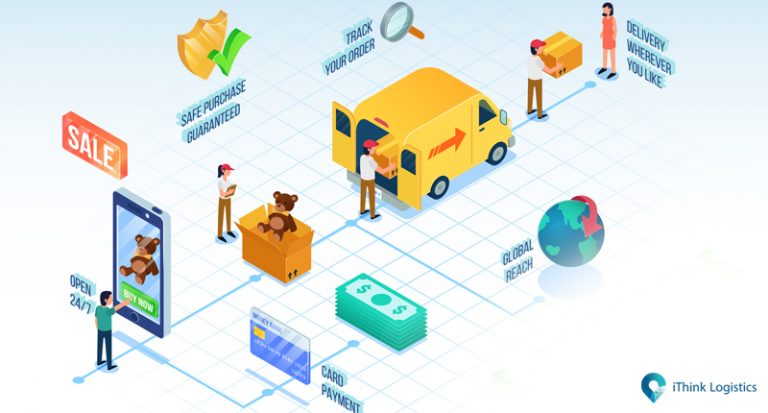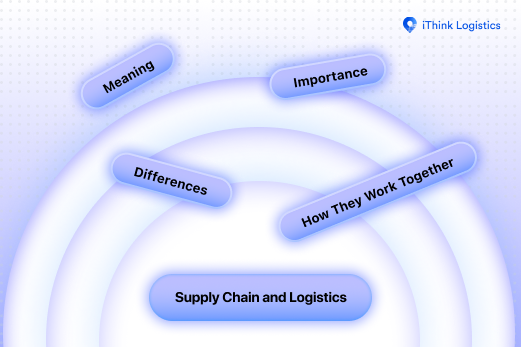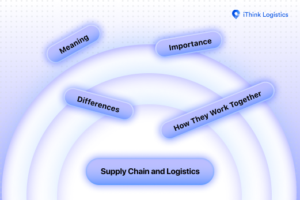With every passing year, the e-commerce industry is growing, and they are allowing the logistics sector to opt for new heights of success. The fact that more people are switching to online purchase every day, is creating a better stepping stone for all these courier companies in India. In this blog, we are going to emphasis on how the e-commerce impact on logistics is allowing both the business grow simultaneously. Read on…
- The E-commerce impact on Logistics Industry
- The e-commerce impact on logistics: Drawbacks and the challenges
- The future ideas for e-commerce logistics
- How do E-commerce logistics work?
- What are the logistics?
- Importance of Logistics
- The two-way process
- Taking care of the order processing
- Eliminating setbacks through proper planning
- Staying updated with the latest information
- How Does E-commerce logistics work in India?
- The current impact of e-commerce on logistics
- Setting up proper shipping rates and methods
- Weighing the products
- Packing it as per requirement
- Selecting a particular source of choice
- How to set up logistics strategies before shipping?
- Conclusion
The e-commerce sector has become more competitive than ever and hugely impacting the logistics business.
While different countries like The United States, China, and Japan are holding the position of the top three players, statistically they are accounting for 21%, 16.8% and 10.4% of the world’s total e-commerce retail sales. Even though the industry still has a lot to explore, the impact it had on other sectors like logistics has been tremendous. So much so, the global logistics market in the e-commerce realm is expected to reach $726 billion by 2020.

The E-commerce impact on Logistics Industry
In this competitive environment, as the customer’s demand is increasing every day, companies like FedEx are launching different fulfillment services to reach the global network. The sellers are distributors are also looking for better ways to carry out hassle-free shipping, and different logistics industries are bringing in a series of innovation to make the process as advanced as possible. In fact, they are even supplying perishable goods within two hours of order placement.
The e-commerce impact on logistics: Drawbacks and the challenges
In an e-commerce logistics, the last mile delivery has always been a challenge. As per the report of CBRE, it has been seen that these e-commerce logistics are transforming the work process of their supply chain and enhanced the performance of the traditional logistics platforms that are dependent on regional distribution.
The future ideas for e-commerce logistics
There have been few other data as well. Below is the list of innovative changes that have been implemented on logistics to stave off the last mile challenges.
- There might be some rules and regulations coming in to reduce the traffic congestion that will cause confusion in deliveries. This might lead to the establishment of different consolidation centers in the rural and urban areas.
- There might be something known as re-logistification that will combine the retail and the logistics.
- Better inventories will be established and increased operational efficiency are expected to be witnessed in the future.
- Mobile warehousing can be an idea to allow flexible distribution.
How do E-commerce logistics work?
In an e-commerce business where on-time delivery is the primary driving force, it is important to understand how a logistics work. Logistics has always been a great challenge, especially in a country like India. Improper delivery, product returns, misrouted item. The terms sound familiar, right?
Whether you are a buyer or an e-commerce seller, the consequences caused due to an unmanaged logistics company affects both the side.
Over the years the various drawbacks of logistics have not only pulled back the growth of e-commerce but have also led to a lot of people losing trust in online businesses.
Henceforth the logistics companies in India decided to bring in some advanced technological implementation in order to reduce errors, and cater to a better management system.
With an increase in popularity of e-commerce, high demands of products took a sharp rise. Therefore it became mandatory for buyers to track their product right from the shipment till it reached the targeted customer.
Logistics and e-commerce go hand in hand, and when it comes to business, one is literally purposeless without the other. India is a vast country with more than 1.8 billion population. Due to a wide diversity in culture, the country witnesses an ample amount of festivals all around the year. For all these occasions, e-commerce has become the go-to place for all residents of the country, and it is really understandable that we need logistics for that.
The model of these e-commerce logistics has become so advanced that now everything can be tracked within a click of a button. Various companies all across the world have said that the logistics sector is one of the most important sectors to watch for in 2019. The fact that logistics are getting customized according to the customer’s needs, has never been more important.
What are the logistics?
A logistics is an organization who acts as a supply chain and helps in coordinating and moving resources from one point to the other. The term logistics has been long originated from the source of the military, to refer to the movement of pieces of equipment and supplies in an organized way.
Importance of Logistics
When we talk about the importance of logistics, know that it is one of the most important factors to consider if you are running an e-commerce business. Even though many startups and other small businesses stress on their own production and quality, but without logistics, no matter how good your products are, it can never reach your customers. This is where the logistics come in. Some of their main services include inbound transportation, outbound transportation, fleet management, warehousing, materials handling, order fulfillment, inventory management, demand planning, etc.

They also impact other aspects of a business as well. Proper coordination and management allows a timely delivery and helps in building a better seller and customer relationship. The popularity of your business depends on how well your logistics works. The bottom line is that good logistics can actually make or break a company. As per the customer’s point of view a negative impact on the delivery service can actually reduce a company’s profitability and reliability.
Earlier, when these e-commerce businesses were not that popular, the only logistics function that we were aware of was the courier delivery. People had to make a physical presence to the store to go and buy something in need. Back in that day, different retailers sourced goods either from manufacturers or the distributors. With the emerge of online stores, direct dealings have reduced to a great extent as the logistics became an intermediary between the two. Hence logistics have become an important part of e-commerce and some of its major functions are written down below.
The two-way process
Logistics mainly functions in two ways. The forward direction and the reverse direction. The forward direction involves delivering from the point of the seller to the point of the customer. Right from the moment of dispatch until delivery of any sort of products, it is the responsibility of the seller to notify the exact location of an order to its respective consignee through tracking via these logistics.

The reverse process includes steps like exchanging, replacements or taking care of the damaged and wrong deliveries. It involves a hassle-free exchange or replacement process that goes a long way in building trust between the buyer and the retailer.
Taking care of the order processing
Order processing is one of the most important functions of logistics. It involves various steps that are carried out using AI-driven technology. The proper specifications of the products are matched before shipment and the description and other technical details are written over the sealed box. The order processing technique also involves billing, taxation, and proper documentation before getting out for delivery. Their other technical steps also include
- Checking if the order contains any special offers and terms.
- Checking the prices and the payment status of the particular product.
- Check for the availability in the warehouse
- Managing packing and scheduling.

Eliminating setbacks through proper planning
Logistics management is not a breezy job and it requires a lot of skills and management. A slight inconsideration might lead to a huge loss for the customers as well as the sellers. So a logistics work in a systematic manner by building up a proper set of plan and executing them the right way. A lot of issues might arrive at any time of the day and proper planning helps them reduce the odds of loss and delays, along with increased customer satisfaction. Some of the steps of planning include:
- Proper vendor selection.
- Taking care of the transportation systems to ensure on-time delivery.
- Managing and keeping a record of the delivery procedure through technological advancement.
Staying updated with the latest information
Every logistics manages its empire by keeping a systematic record. They are always aware of every order and are notified of their delivery status. By working in a calculated manner, these e-commerce logistics helps in providing the best services for these online stores.
Thus it has now become clear that an e-commerce company is non-functional without logistics and vice versa. With the advancement of technology, these logistics are digitizing their way of work and easing the method of transportation. These logistics possesses one of the largest benefits for different buyers and sellers across the world. These logistics act as a single point of contact and holds the capability to take action during any sort of mismanagement.
How Does E-commerce logistics work in India?
As far as India is concerned, logistics is considered as a backbone of the country’s economy. The e-commerce logistics sector in India is evolving rapidly. By successfully going hand in hand with the entire e-commerce industry, they have been able to successfully serve the people of the country. The logistics industry is expected to reach over USD 2 billion by 2019. Rise of e-commerce logistics and increased domestic consumption will lead the way for the industry in the coming years. With a promise of growth and improvements, the service-oriented logistics industry is ready to expand beyond the horizons in the latter half of this decade.
The current impact of e-commerce on logistics
The recent Indian logistics sector comprises of inbound and outbound segments of the manufacturing and service supply chains. It is estimated that the Indian logistics industry will continue to show robust growth of 10-15% annually, leading the pace of growth of the economy at large. If you ask what a logistics company do, there are two answers.

One, they move product in the forward direction, and others in the backward direction. The movement of products in the forward direction is known as freight forwarding. It is a process that involves shipping a product from the seller to the customers.
The second process is a reverse movement that is often termed as reverse logistics. It is done when a product is not delivered to the customer. Reverse logistics is a beneficial logistics process that prevents product damage and allows it’s reuse.
It is very important to define a particular shipping strategy to ensure proper delivery. These blogs talk about some of the shipping strategies and how they work. Read on…
Setting up proper shipping rates and methods
By setting up a proper shipping rate, you will be able to understand the profit that you are getting. Do proper market research and understand if you are willing to pass the whole shipping cost to the customer. You can also deliver it without charging shipping cost as well.
For most cases, it has been seen the customer prefers the companies that don’t apply any shipping cost on the products.
Weighing the products
Different shipping companies calculate their product value depending on the weight of the product. This helps them identify shipping charges, transportation, and labor costs. By getting an idea you will be able to provide an accurate cost to your customers.
Packing it as per requirement
There are quite a number of options available when it comes to packaging. You can choose your packaging materials depending on your product so that they reach the customers undamaged. This is another segment that you need to keep in mind while calculating the shipping cost.
Selecting a particular source of choice
By sourcing your packaging, you don’t have to worry about the quality. This will help you prevent multiple shipments of the same product, due to any sort of damage.
How to set up logistics strategies before shipping?
Even though different logistics have their own shipping methods, but the ideology is more or less the same. Here are some of the ways to set up the shipping method.
Offer free shipping
Most companies choose to ship the products free for their customers. This is one of the best technique to avoid window shopping by customers. Over the years it has been seen the company who applies shipping charges face the most cart abandonment.
You might increase the product price, but do not mention the extra shipping charges. You can also offer free shipping for a minimum amount of order so that you don’t face loss in your business.
Charging the real-time rates
Charging a real-time carrier rate is a great strategy for your shipping. In this method. By making this feature available your customers will be able to choose and pay for the particular service that they want.
Impose a flat rate
By imposing a flat rate you will be able to make sure you set extremely price differences for your customers. This type of strategy works best when there is a fair standard of products that will be beneficial to both parties.
Conclusion
Do let us know how the logistics sector have helped your business and what are the drawbacks you have faced in the process. Give out your thoughts in the comment section below.













Leave a Reply